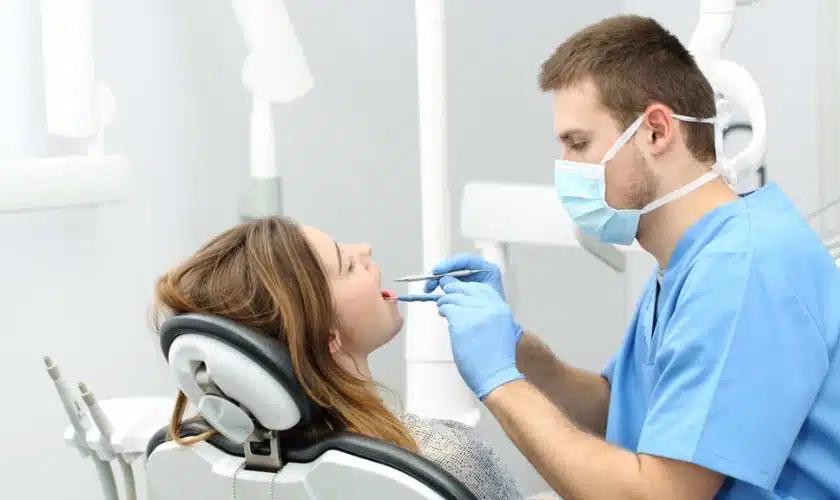Dental anxiety, a common yet often overlooked issue, affects a significant portion of the population. The mere thought of sitting in a dentist’s chair induces nerves and stress for many. Despite advancements in dental care, some individuals continue to avoid regular check-ups due to overwhelming fear.
This article offers a detailed guide on overcoming dental anxiety, with insights from UK dental professionals, including Mayfield Dental, the best dentist in South Croydon.
Understanding Dental Anxiety

Dental anxiety and fear are prevalent yet vary greatly in intensity. For some, the anxiety may manifest as mild discomfort, while others might experience severe phobia that deters any dental visit. Understanding the roots of dental anxiety is the first step towards addressing it. Anxiety can be triggered by past traumatic dental experiences, fear of pain, feelings of helplessness, or embarrassment about oral hygiene.
Familiarity with these triggers allows dental professionals to approach anxious patients with empathy and tailor their care accordingly. Recognising that anxiety is a legitimate and common concern encourages a supportive and non-judgmental environment in dental practices.
Communication is Key
Effective communication between the dentist and the patient stands as a fundamental strategy in alleviating anxiety. Patients should feel comfortable expressing their fears and concerns. Many dental practices, including Mayfield Dental, encourage an open dialogue where patients can raise issues before the treatment begins.
Clear explanations about the procedures, what to expect, and how long it will take can help demystify the process. Knowing what’s happening can reduce feelings of uncertainty and fear. Dentists should also keep the patients informed during the procedures, thereby maintaining trust and reassurance.
Familiarisation Visits
For those with profound dental anxiety, scheduling familiarisation visits can be particularly beneficial. These are non-treatment appointments intended purely for the patient to become comfortable with the dental environment. During these visits, one can meet the staff, explore the clinic, and understand the instruments used.
The patient can use this opportunity to discuss specific fears and agree on signals with the dentist to indicate discomfort or a desire to pause during future treatments. By lessening the unfamiliarity, these visits lay the groundwork for a positive dental experience.
Mindfulness and Relaxation Techniques

Mindfulness and relaxation techniques have shown promising results in managing dental anxiety. Practices such as deep-breathing exercises, progressive muscle relaxation, or guided imagery can significantly reduce stress levels. Prior to the appointment, patients can practise these techniques to achieve a calm state of mind.
Additionally, listening to music or watching relaxed videos on a tablet during the procedure may divert attention away from the dental work. Some dental practices also use aromatherapy, with soothing scents such as lavender, to create a serene environment and help patients relax.
Sedation Options
For those who find relaxation techniques insufficient, sedation dentistry offers an alternative. Various levels of sedation are available, from mild sedatives to help patients stay calm to more profound sedation methods.
Inhalation sedation, better known as laughing gas, is a widely used method that allows patients to remain conscious yet deeply relaxed. Intravenous sedation and oral sedatives are other options for more severe cases of anxiety. Patients should discuss these options with their dentists to determine the most appropriate method based on their anxiety severity and the required procedures.
Cognitive Behavioural Therapy (CBT)
Cognitive Behavioural Therapy (CBT) is an effective psychological approach for addressing dental anxiety. This therapy involves working with a trained therapist to change negative thought patterns and behaviours related to dental fear.
CBT sessions often include education about dental procedures, breathing techniques, and gradual exposure to feared situations. By focusing on the root causes of anxiety and teaching coping mechanisms, CBT empowers patients to manage their dental fear more effectively. Many find a noticeable reduction in anxiety, enabling them to maintain regular dental appointments without overwhelming fear.
Choosing the Right Dental Practice

Selecting a dental practice that understands and prioritises the needs of anxious patients is crucial. Clinics like Mayfield Dental in South Croydon have established reputations for their compassionate approach and specialised anxiety management services.
Patients are encouraged to research and visit different clinics, seeking recommendations from friends or reading reviews. A practice known for its patient-centred care, with staff trained in handling anxiety, makes a significant difference. Establishing trust with the dental team ensures that patients feel valued, heard, and respected.
Building a Positive Routine
Establishing a positive dental routine can also aid in overcoming anxiety. Regular dental check-ups, rather than waiting until an issue arises, can foster a sense of routine and normalcy. Positive reinforcement, such as rewarding oneself after completing a dental visit, can further motivate maintaining consistent appointments.
Patients are advised to adhere to excellent oral hygiene habits to minimise the need for extensive interventions, which can trigger anxiety. This routine includes brushing twice daily, using floss and mouthwash, and maintaining a balanced diet to promote oral health.
Conclusion
Overcoming dental anxiety requires a multifaceted approach, incorporating communication, familiarisation, relaxation techniques, and professional support. Understanding and addressing the underlying causes of fear can lead to successful management, promoting regular dental care and better overall health.
The tips in this guide, provided by Mayfield Dental, emphasise the importance of choosing a caring and empathetic dental practice, practising relaxation techniques, and considering professional therapy options. By taking these steps, even the most anxious patients can look forward to a future of stress-free dental visits.





